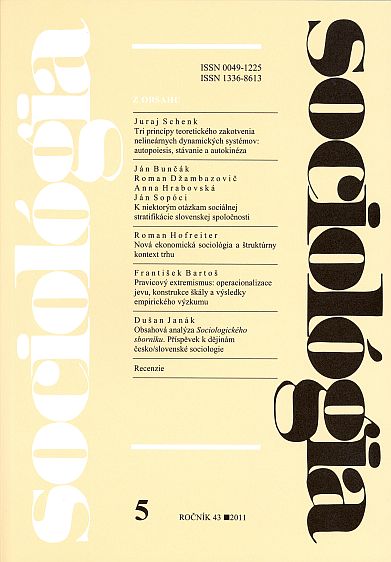Pravicový extremismus: operacionalizace jevu, konstrukce škály a výsledky empirického výzkumu
Right-Wing Extremism: Operationalization, Construction of the Scale and Results of Empirical Research
Author(s): František BartošSubject(s): Social Sciences
Published by: Sociologický ústav - Slovenská akadémia vied
Keywords: right-wing extremism; inequality; foreigners; minorities; hate crime; gypsies
Summary/Abstract: Right-Wing Extremism: Operationalization, Construction of the Scale and Results of Empirical Research. This article presents the results of research conducted as part of a project of the Czech Ministry of Interior. Its main objective was to explore the risk level of right-wing extremism in the Czech Republic. One of the project’s phases was a survey (n = 2056, population of people older than 15 years, probabilistic sampling). Through face-to-face interviews, we discovered that 2.5 % of inhabitants in the Czech Republic go along with the ideas of the ultra-right wing and are also willing to support radical political parties in elections. The percentage of people who support ideas typical for right-wing extremism and moreover are willing to publically support political parties which offer radical solutions (through participation in right-wing demonstrations, or by helping with the organization of their events) reaches 6 %. Our research shows that the main risk (from the point of view of the combat against right-wing extremism) represents the latter group. The research also reveals that the sources of extremism are multiple and that this phenomenon encompasses macro-social as well as micro-social issues. From the macro-social point of view, it is possible to point to influences like unemployment, the level of education, the atmosphere in the society, the individual’s ability to integrate and reach his/her goals etc. In the micro-sociological frame of reference, it was found that extremism is influenced, for example, by satisfaction with family relationships, an ability for self-realization, material provision, and the extent of personal experience with minorities and foreigners. Some psychological and socio-psychological factors apply as well (e.g. temperament, stereotypes and prejudices). Sociológia 2011, Vol. 43 (No. 5: 550-583)
Journal: Sociológia - Slovak Sociological Review
- Issue Year: 43/2011
- Issue No: 5
- Page Range: 550-583
- Page Count: 34
- Language: Czech

